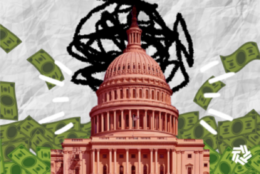House of Representatives
-
Rep. James Lankford (R-Okla.) has cosponsored two pieces of legislation that target duplication of government services, both in the legislative and executive branches.
May 08, 2012 -
Dr. Sonja Batten, deputy chief for specialty mental health, Veterans Affairs Department, discusses the VA's plans to hire 2,000 mental health professionals and support staff. Rep. James Lankford (R-Okla.) talks about two bills aimed at reducing the number of duplicative government programs.
May 08, 2012 -
The Armed Services committee Seapower chairman is tired of waiting for the Navy's ship building plan to come in.
May 08, 2012 -
Congressmen introduce the Harry Lew Military Hazing Accountability and Prevention Act of 2012, a bill aimed at preventing hazing in the military services.
May 08, 2012 -
A plan to avoid automatic cuts to discretionary federal spending, including the Defense Department's, advanced in the House, passing the budget committee and heading to the House floor for a vote later this week. Among the $300 billion in alternative cuts approved by the committee, in a 21-9 party-line vote, is a provision requiring federal employees to pay more for their retirement benefits.
May 07, 2012 -
As part of the annual Defense authorization bill, House lawmakers will take up a provision designed to let federal employees gain experience and share expertise while working temporarily in other agencies.
May 07, 2012 -
This week on AFGE's "Inside Government" National Secretary-Treasurer J. David Cox, 8th District National Vice President Jane Nygaard and Legislative Representative Marilyn Park preview National Nurses Week May 6 - 12. The trio discusses challenges federal nurses face at the Department of Veterans Affairs, Bureau of Prisons and Department of Defense and highlights the union's Nurses Steering Committee.
May 02, 2012 -
The four sponsors of postal reform legislation in the Senate are asking the Postal Service to delay closing post offices and mail processing facilities until the new law is in place.
May 02, 2012 -
Would changing federal retirement rules trigger a mad rush to retirement? Or would it turn the government into an institution run by tired, over- the-hill zombies, Senior Correspondent Mike Causey wonders ... kind of like Congress.
May 02, 2012 -
Despite a veto threat from the President, the House passed the Cyber Intelligence Sharing and Protection Act (CISPA) Thursday , along with three other cybersecurity bills.
April 27, 2012 -
On a voice vote, the House backed the Digital Accountability and Transparency Act, known as the DATA Act. The legislation would establish uniform standards for all recipients to report federal money and set up a single website where average Americans could search for information on how government agencies, departments and other recipients spend federal funds.
April 26, 2012 -
Democrats control the White House and the Senate, while Republicans call the shots in the House. So what impact has divided government had on federal workers? Some people think things could be a whole lot worse if one party ran all three operations at the same time, Senior Correspondent Mike Causey says.
April 26, 2012 -
The House is expected to vote on — and pass — the bipartisan Digital Accountability and Transparency Act, which aims to save taxpayer money by tracking spending by federal agencies.
April 25, 2012 -
Rep. John Mica (R-Fla.) is calling for the General Services Administration to stop paying an official at the center of the conference spending scandal.
April 24, 2012 -
The administration has tried to get in front of the debate over the information sharing aspects of one of the cybersecurity bills up for debate in the House Thursday. Democratic lawmakers and industry groups expressed concern over the Cyber Intelligence Sharing and Protection Act (CISPA) arguing its provisions on what information is to be shared and with whom are too broad.
April 23, 2012





